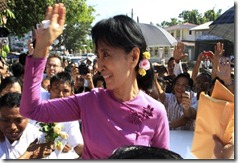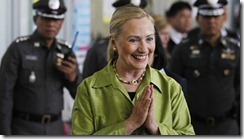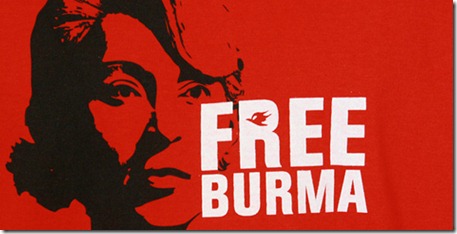Following months of confusion it is becoming ever clearer that the situation in Burma is gradually changing for the better.
 After effectively barring Aung San Suu Kyi’s National League for Democracy (NLD) from partaking in last year’s sham election, the military regime’s pseudo-civilian government has now repealed laws requiring the expulsion of ex-political prisoners, and the recognition of the military-drafted constituion, by parties involved in the political process. This historic move left the way open for the NLD to declare last Friday that it will field candidates, possibly including Suu Kyi herself, to stand in upcoming by-elections.
After effectively barring Aung San Suu Kyi’s National League for Democracy (NLD) from partaking in last year’s sham election, the military regime’s pseudo-civilian government has now repealed laws requiring the expulsion of ex-political prisoners, and the recognition of the military-drafted constituion, by parties involved in the political process. This historic move left the way open for the NLD to declare last Friday that it will field candidates, possibly including Suu Kyi herself, to stand in upcoming by-elections.
The prospect of NLD members finally sitting in Parliament was virtually unforeseeable to democracy activists even just a few months ago. In all likelihood they will be re-joined by their comrades from the National Democratic Force (NDF) who split away in 2010 to contest the elections, providing a four seat boost to however many candidates they are able to get elected.
The feeling on the ground is changing too. NLD meetings are held more openly, posters of Aung San Suu Kyi are sold on some streets, and the democracy icon, who spent over a decade locked away from the eyes of the world, is now able to give interviews to the BBC. This follows the legalisation of trade unions and strikes as well as an easing of restrictions on the internet that has seen Burmese people able to access sites such as Youtube and this blog.
An announcement from the US government that Hillary Clinton will visit Burma (the first Secretary of State to do so for more than fifty years) has raised further hopes, particularly around the prospect of fresh prisoner releases. Indeed, the Obama administration must be commended for its on-going push for greater reform, which has included direct contact between the President and Aung San Suu Kyi, as well as a tough line on the issues that still need to be addressed.
first Secretary of State to do so for more than fifty years) has raised further hopes, particularly around the prospect of fresh prisoner releases. Indeed, the Obama administration must be commended for its on-going push for greater reform, which has included direct contact between the President and Aung San Suu Kyi, as well as a tough line on the issues that still need to be addressed.
And there are many of these; not least the continuing Burmese government attacks on Kachin freedom fighters, that have so far displaced some twenty-five thousand people and killed thousands more. The humanitarian disaster now unfolding in the region is mirrored in the Shan and Karen states where similar brutality by  government forces has left an untold number Burma’s maligned ethnic minority people without food or shelter. Suu Kyi has pledged to stand by these groups and called for resolution of the conflicts to be a key priority. Yet by meeting and negotiating with ‘reformist’ President Thein Sein, she risks loosing a degree of credibility amongst those whose families are being butchered by his soldiers.
government forces has left an untold number Burma’s maligned ethnic minority people without food or shelter. Suu Kyi has pledged to stand by these groups and called for resolution of the conflicts to be a key priority. Yet by meeting and negotiating with ‘reformist’ President Thein Sein, she risks loosing a degree of credibility amongst those whose families are being butchered by his soldiers.
It is also important for those working for freedom in Burma to remember that political engagement does not equal liberty. For proof of this, one only needs to look at Zimbabwe, where the Movement for Democratic Change (MDC) controls a majority of seats in Parliament, as well as the post of Prime Minister, and yet Robert Mugabe’s Zanu-PF regime continues to rule the country through violence. A recent incident in which members of the Burmese government’s Union Solidarity and Development Party (USDP), beat two NLD activists into unconsciousness with iron bars, was all to reminiscent of the faux-democratic Zimbabwe-style politics.
Experts from organisations such as Burma Campaign UK have also been vocal in stressing the limitations of changes so far. They point out that despite the easing of restrictions on websites, only 0.3% of Burmese people actually have internet access at all; despite political prisoner releases, hundreds remain detained in appalling conditions; and all the while appalling human rights abuses including rape and sexual abuse by government forces continue unabated.
This leaves activists with a long way to go, despite the justifiable cause for optimism and the new opportunities open to the democracy movement. NLD involvement in the political process can ultimately only be a good thing, but it is just the beginning of the road. The obstacles – from state violence against ethnic minorities to the inbuilt bias in the political system towards the government- will need unity, determination and worldwide support to overcome. Having achieved their goal of securing the 2014 chairmanship of ASEAN, it is also possible that the government will slow down the pace of reform. The hard work starts here.




No comments:
Post a Comment